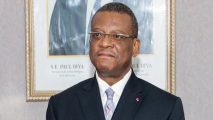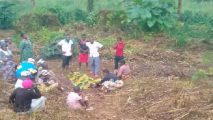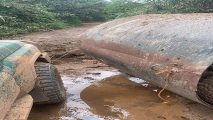Categories
Recent Posts
- Football: Panthère du Ndé Wins Cameroon Cup 2025
- Fifa brings in new £45 ticket for 2026 World Cup
- President Sisiku Ayuk Tabe, top aides to appear before the Supreme Court
- Pressure mounts on Biya as speculation grows over possible replacement of Ngute
- 2025 is the year when Biya’s long rule finally lost its last convincing justification
Archives
- December 2025
- November 2025
- October 2025
- September 2025
- August 2025
- July 2025
- June 2025
- May 2025
- April 2025
- March 2025
- February 2025
- January 2025
- December 2024
- November 2024
- October 2024
- September 2024
- August 2024
- July 2024
- June 2024
- May 2024
- April 2024
- March 2024
- February 2024
- January 2024
- December 2023
- November 2023
- October 2023
- September 2023
- August 2023
- July 2023
- June 2023
- May 2023
- April 2023
- March 2023
- February 2023
- January 2023
- December 2022
- November 2022
- October 2022
- September 2022
- August 2022
- July 2022
- June 2022
- May 2022
- April 2022
- March 2022
- February 2022
- January 2022
- December 2021
- November 2021
- October 2021
- September 2021
- August 2021
- July 2021
- June 2021
- May 2021
- April 2021
- March 2021
- February 2021
- January 2021
- December 2020
- November 2020
- October 2020
- September 2020
- August 2020
- July 2020
- June 2020
- May 2020
- April 2020
- March 2020
- February 2020
- January 2020
- December 2019
- November 2019
- October 2019
- September 2019
- August 2019
- July 2019
- June 2019
- May 2019
- April 2019
- March 2019
- February 2019
- January 2019
- December 2018
- November 2018
- October 2018
- September 2018
- August 2018
- July 2018
- June 2018
- May 2018
- April 2018
- March 2018
- February 2018
- January 2018
- December 2017
- November 2017
- October 2017
- September 2017
- August 2017
- July 2017
- June 2017
- May 2017
- April 2017
- March 2017
- February 2017
- January 2017
- December 2016
- November 2016
- October 2016
- September 2016
- August 2016
- July 2016
- June 2016
Featured
 2025 is the year when Biya’s long rule finally lost its last convincing justification
2025 is the year when Biya’s long rule finally lost its last convincing justification  Young Cameroonians: Build social capital to succeed
Young Cameroonians: Build social capital to succeed  Eulogy for HRH Nfor Professor Teddy Ako of Ossing
Eulogy for HRH Nfor Professor Teddy Ako of Ossing  Will Fr. Paul Verdzekov recognize the refurbished and rededicated Cathedral in Bamenda were he to return today?
Will Fr. Paul Verdzekov recognize the refurbished and rededicated Cathedral in Bamenda were he to return today?  Cameroon apparently under a de facto federalism
Cameroon apparently under a de facto federalism
Most Commented Posts
 4 Anglophone detainees killed in Yaounde
4 Anglophone detainees killed in Yaounde
18 comments Chantal Biya says she will return to Cameroon if General Ivo Yenwo, Martin Belinga Eboutou and Ferdinand Ngoh Ngoh are sacked
Chantal Biya says she will return to Cameroon if General Ivo Yenwo, Martin Belinga Eboutou and Ferdinand Ngoh Ngoh are sacked
13 comments The Anglophone Problem – When Facts don’t Lie
The Anglophone Problem – When Facts don’t Lie
12 comments Anglophone Nationalism: Barrister Eyambe says “hidden plans are at work”
Anglophone Nationalism: Barrister Eyambe says “hidden plans are at work”
12 comments Largest wave of arrest by BIR in Bamenda
Largest wave of arrest by BIR in Bamenda
10 comments
Latest Tweets
Featured
-

Football: Panthère du Ndé Wins Cameroon Cup 2025
-

Fifa brings in new £45 ticket for 2026 World Cup
-

President Sisiku Ayuk Tabe, top aides to appear before the Supreme Court
-

Pressure mounts on Biya as speculation grows over possible replacement of Ngute
-

2025 is the year when Biya’s long rule finally lost its last convincing justification
-

Armed Mbororo tribesmen killed 8 in Southern Cameroons’ new war
-

Southern Cameroons Crisis: Atanga Nji Boys abduct 8 people en route to Kumbo
© Cameroon Concord News 2025
22, May 2018
Southern Cameroons Crisis: Ambassador Peter Barlerin should continue ratcheting up the pressure 0
by soter • Editorial, Headline News
President Biya’s time as head of state is now short. To be sure, the Cameroonian dictator is a dead man walking according to recent statements made by the US ambassador to Yaoundé, Peter Barlerin, a view shared by many in the ruling CPDM Central Committee and predicted by senior French Cameroun political experts. The 85 year old leader has survived almost 2 years of Southern Cameroons demonstrations and growing violence, and if not pushed by the US and the French including some outside actors he may yet cling to power in the upcoming so-called presidential elections.
It’s easy to see why many Cameroonians think Ambassador Peter Barlerin’s pronouncement indicates that Biya’s time might be up. Despite the killings of over 1,000 Southern Cameroons protesters and the arrests of thousands more, Southern Cameroonians have bravely defied the Yaoundé regime, which now seems unable to bully them into submission.
As the Southern Cameroons resistance has stood strong, Biya’s international support has plummeted. But for the French, the CPDM regime would have been a thing of the past. Although the world is actually not doing anything as Biya regime forces continue to gun down innocent Southern Cameroonian civilians, Ambassador Peter Barlerin’s recent comments is a clear indication that the time has come for Mr. Paul Biya to step aside.
The United States chief diplomat in Cameroon has repeatedly called for genuine and inclusive dialogue and has offered himself to try to broker a deal for Biya to speak with the Ambazonian leadership. Biya has constantly scorns these calls and consequently his cash-strapped regime will soon find it harder to pay its tribal security services. Rather than kill innocent Southern Cameroonians, several soldiers have defected from the Cameroon army. Cameroon Concord News Group gathered that the pace is escalating at catastrophic rapidity, and many more French Cameroun army soldiers are now confined to barracks in Buea and Douala because the Biya regime doesn’t trust them. The Ambazonia Self-Defense Council Restoration Forces is apparently controlled largely by defectors and it is getting stronger and is now operating freely in the various Southern Cameroons counties.
The US ambassador’s killer punch has hit the Yaoundé regime hard, but Biya has neither bent nor broken — and he still has a number of serious assets including the French government, the CEMAC countries and mighty Nigeria on his side of the equation.
Looking at the loyalty of the military and security services, the Southern Cameroons Self-Defense Council Restoration Forces is getting stronger, but it lacks long or short range missiles and other heavy weapons. So it finds it difficult to hold territories. The Francophone regime is still stronger than the Southern Cameroons Interim Government. The presidential guard and a huge regiment of ground forces particularly those from the Far North region recruited by the ailing Vice Prime Minister Amadou Ali during his time at the defense ministry are still loyal, and Biya’s blood relations and kinsmen hold key positions in the Cameroon government. The overwhelming majority of the officers are Francophone Cameroonians and nearly every family from Biya’s ruling tribes the Beti-Ewondo have at least one member in the security service.
The Far North region again is a strong base for the regime: It is well armed, mobilized, and fearful that the fall of Biya might invoke a nasty past that led to the killing of hundreds of soldiers from the North region headquartered in Garoua immediately after the April 6th coup in 1984. The regime has created militias along with military forces, using them as thugs and snipers against Southern Cameroonian citizens. As the violence escalates, sectarian killing increases too. Deep within the Biya regime the military hierarchy and Biya acolytes eat first; the funny SDF opposition eats last. The French government via its multinationals is giving the Biya regime an economic lifeline and enough bullets to keep shooting down Southern Cameroonians and is blocking international efforts by the Ambazonian Interim Government to isolate the regime.
The biggest hope for Biya now is the disorganization created by some of the Southern Cameroons resistance figures group under an obscure organization known as the Ambazonia Recognition and Collaborative Council. There is no charismatic leader among the trio but their main goal is to attack the legitimate Interim Government of the people of Southern Cameroons. Not surprisingly, there are sharp divisions between those on Ground Zero bearing the brunt of the Biya regime’s brutality and those who live safely outside Southern Cameroons and represent the struggle abroad. So far at least, the Interim Government enjoys some sympathy from the international community but no active support from major powers such as the US and Britain.
To be accurate, the French Cameroun dictator is not strong enough to subdue the Ambazonian resistance and quest for an independent state, but Ambazonians are not just strong enough to defend the Southern Cameroons territory — a scenario for continued fighting and killing.
If Southern Cameroonians are to pull out of the Cameroon federation, they need a push from the international community. Particularly important is the effort to build up a Southern Cameroons army: uniting it and training its officers so they can be more effective in battle. At the same time, the Interim Government must avoid the distractions coming from the so-called Ambazonia Recognition and Collaborative Council at all costs.
The IG should continue pushing for a UN and EU intervention to be on the table to signal that the international community is aware of the genocide going on in Southern Cameroons. U.S. and European Union rhetoric should warn that military option will grow more likely if Biya doesn’t step down. The US ambassador should continue ratcheting up the pressure as this will help convince CPDM loyalists that the regime cannot weather the storm and that they need to abandon ship now — rather than do so when bombs starts dropping in Yaoundé. Only this forceful effort started by Ambassador Peter Barlerin will end the rule of the man who has been walking his people into a nightmare. Any less will see the bloodshed continue indefinitely, possibly sucking in neighboring states like Nigeria.
By Soter Tarh Agbaw-Ebai